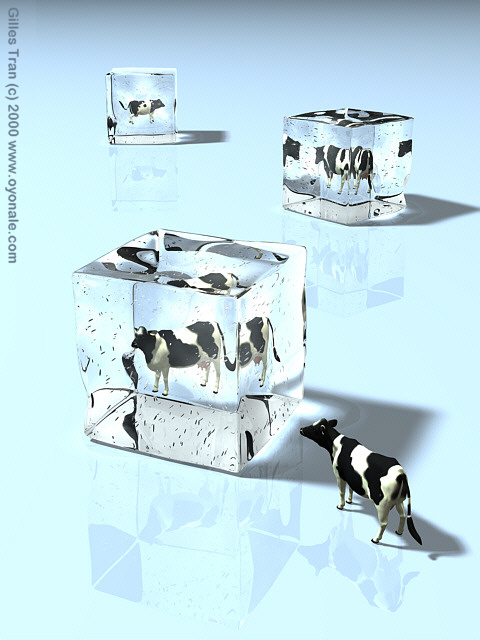



Farmer Bob woke up before dawn, as he was wont to do. Though his body still ached from the work done the day before, he thought with pleasant anticipation of the tasks ahead. In the complete darkness, he rose from his bed, and his head hit something hard. Lights around him came alive and he became aware, once more, that he wasn't in Kansas anymore.
Then he knew where he was, and why, in this place, there was no such thing as dawn.
He should have done the check-up first, but he needed to feel like a man. His woolly legs carried him to the dinner table, whose exact position he remembered. He fumbled with dials and glowing read-outs until something brown and liquid came off a steel nozzle. He filled up a styrofoam cup with this coffee wannabe, and managed to found a couple of gaudy packages that carried pictures of bacon and eggs. Following carefully the instructions written in small type on the bags, he slipped them in a slot of the wall, pushed a button and waited for his breakfast to be served.
A shower later, things started making sense again. He swore to himself that he would do everything by the book next time, though he may have made the same promise once a year in the last decade. The loss of memory was scary, but it had been deemed necessary for the travellers? welfare. Or so the pocket guide he found near his bunk reminded him.
The coolers were on the other side of the ship. As he didn't feel like walking over, he let a robot cart take him. The cooler room was huge. He remembered being impressed every time he went there. Each cooler was the size of a trailer, except for the ones that held goods that didn't require life-supporting apparatuses. According to the guide, he had to check the coolers from left to right, row after row. He had little to do, actually. If something had gone wrong, it was already too late. The whole system took care of itself, reporting the most serious problems to people who knew how to solve them, or to prevent them from happening again. Those people were light years away.
The first cooler lit up when he approached. Somewhere inside, a device started to buzz and a little panel slipped open, revealing a window. He got closer. From the other side of the glass, his mother-in-law was staring at him, a frown on her worried face. No, her eyes were closed. It was just a trick of light. Condensation blurred her features. He saw her slightly plump limbs twitch, though, but he knew that only movements he would observe in the coolers were caused by the machines who fed, massaged, exercised and stimulated the living bodies they kept in custody. He did the manual check-up, validating the life signals, and proceeded to the next cooler, which contained a cousin whose name escaped him until he realised that it was written on a tag under the window.
The twelfth cooler contained his wife, the eighteenth his elder son and the twenty-first his little daughter. He waved them hellos, thinking that it was a sad thing that his family didn't make the trip in a more united fashion (a safety procedure, said the guide). Melancholy got hold of him. He wanted to go back to sleep now, but he had a last chore to do.
The coolers at the far end of the room were bigger than the ones in front. They didn't wear names on them, only numbers. However, Farmer Bob recognised immediately the black and white pattern on the large, square body behind the glass. He watched for a while the gentle heaving of the cow's flanks and the occasional tremors on her skin. And the erratic flailing of her tail, which was chasing flies in deep space.
A few hours later, farmer Bob sat on his bunk, preparing himself for